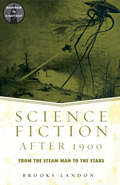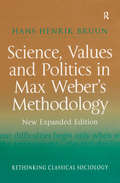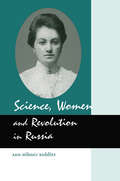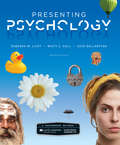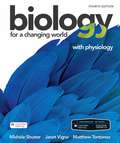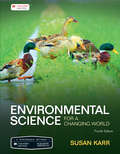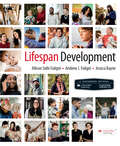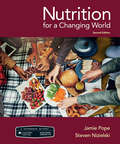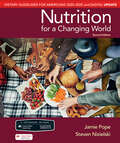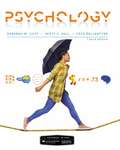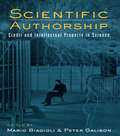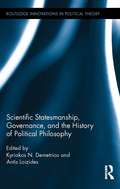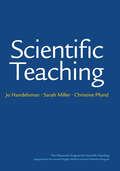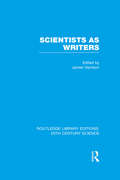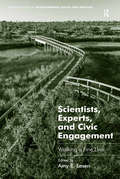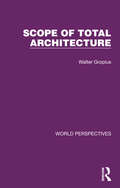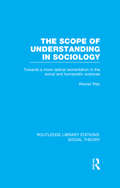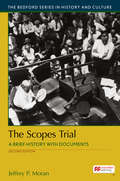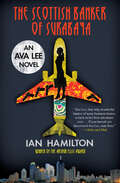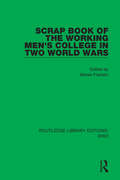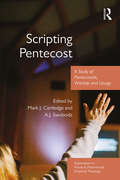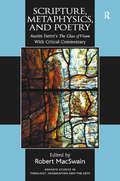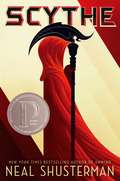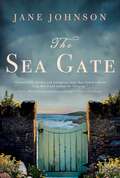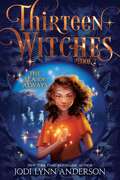Special Collections
Benetech’s Global Certified Accessible Titles
Description: Benetech’s GCA program is the first independent third-party EPUB certification to verify ebook accessibility. By creating content that is born accessible, publishers can meet the needs of all readers. Learn more: https://bornaccessible.benetech.org/
- Table View
- List View
Science Fiction After 1900
by Brooks LandonFirst published in 2003. Routledge is an imprint of Taylor & Francis, an informa company.
Science, Values and Politics in Max Weber's Methodology
by Hans Henrik BruunFirst published in 1972, this book on Weber's methodological writings is today regarded as a modern classic in its field. In this new expanded edition, the author has revised and updated the original text, and translated the numerous German quotations into English. He has also added a new introduction, where he discusses major issues raised in the relevant secondary literature since 1972. The author traces the relationship between values and science in Max Weber's methodology of its central aspects: value freedom, value relation (Wertbeziehung), value analysis, the ideal type and the special problems which pertain to the sphere of politics. Weber's thought is presented and discussed on the basis of a meticulous analysis of all available, published or unpublished, original material. The book is indispensable for all serious Weber scholars and provides the general student with a clear, accessible and authoritative exposition of major aspects of Weber's methodology.
Science, Women and Revolution in Russia
by KoblitzWhile the women's movement might seem like a relatively new concept, Russian women of the 1860s deserve to be acknowledged as individuals who changed the direction of science and opened the doors of higher education to women throughout Europe. The 1860's and 1870's witnessed a rise in women's consciousness and the beginnings of the Russian revolutionary movement that saw women pursue and receive doctorates in many areas of science. These same women went on to become some of the brightest in their fields. This book provides a look at Russian women scientists of the 1860's, their personal independence, and technical and literary achievements that made science the popular social movement of the time and changed the face of the Russian intellectual culture.
Scientific American
by Deborah Licht and Misty Hull and Coco BallantyneIn this breakthrough student resource, two committed, tech-savvy professors, Deborah Licht and Misty Hull, combine years of research and teaching insights with the journalistic skill of science writer, Coco Ballantyne, who came to the project directly from Scientific American. Together, they have created an introductory psychology textbook and online learning and comprehension system that draws on written profiles and video interviews of 26 real people to help students better understand, remember, apply, and relate to psychology’s foundational concepts and ideas. Beautifully designed, the printed text is filled with high-interest examples and features, including full-page infographics that help students understand and retain key concepts. Online, additional author-created resources, including scaffolded activities and adaptive quizzes, provide a seamless learning experience for students and a reliable assessment mechanism for instructors and programs. This innovative collaboration between Worth Publishers and Scientific American reflects a commitment to engaging and educating all students, including those who sometimes seem difficult to engage—in the contemporary style of the world’s most respected science magazine. Along with student engagement with the personal stories, Presenting Psychology 2e also aims to: Demonstrate that psychology is a science Help students see the “big picture” Provide high-quality accessible visuals that make a difference! Illustrate real-world applications Maintain a positive perspective of psychology Emphasize gender and cultural diversity Help dispel myths Provide quality assessments Create interactive, technology-based learning that appeals to students
Scientific American Biology for a Changing World with Physiology
by Michele Shuster and Janet Vigna and Matthew TontonozBiology for a Changing World with Physiology is a textbook you�ll actually want to read. By presenting the science through compelling Scientific American style stories, this book will help you understand the relevance of biology to your world.
Scientific American Environmental Science for a Changing World
by Susan KarrAvailable for the first time with Macmillan's new online learning tool, Achieve, Susan Karr’s Environmental Science for a Changing World 4e uses an engaging, journalistic approach—real stories about real people—to show students how science works and how to think critically about environmental issues. Each module reads like a single, integrated Scientific American-style article with clear explanations of essential processes and concepts enhanced with beautifully designed infographics.
Scientific American: Lifespan Development
by Andrew J. Fuligni and Jessica Bayne and Allison Sidle FuligniA journey through the current landscape of lifespan development through a series of Scientific American-style profiles of some extraordinary individuals.
Scientific American: Nutrition for a Changing World
by Jamie Pope and Steve NizielskiNutrition for a Changing World engages students like no other nutrition textbook. Real stories – about real people and real science – are integrated into every chapter, bringing context and relevance to the core science. Infographics in the style of Scientific American magazine are like “science storyboards” that guide students step-by-step through essential processes and concepts. Coverage of timely topics such as gluten-free diets, the diabetes epidemic, and global nutrition exemplify the book’s contemporary approach to nutrition science. Nutrition for Changing World is also the only product for the course to offer automatically graded diet analysis activities. AnalyzeMyDiet provides both a diet tracker and personalized, auto-graded diet analysis activities built to cover a standard 3- to 7-day diet analysis assignment, freeing instructors from hand-grading these projects.
Scientific American Nutrition for a Changing World: Dietary Guidelines for Americans 2020-2025 & Digital Update
by Jamie Pope and Steven NizielskiWritten and illustrated in the style of Scientific American magazine, Nutrition in a Changing World, this update includes the latest U.S. dietary guidelines.
Scientific American: Psychology
by Deborah Licht and Misty Hull and Coco BallantyneIn this breakthrough student resource, two committed, tech-savvy professors, Deborah Licht and Misty Hull, combine years of research and teaching insights with the journalistic skill of science writer, Coco Ballantyne, who came to the project directly from Scientific American. Together, they have created an introductory psychology textbook and online learning and comprehension system that draws on written profiles and video interviews of real people and their stories to help students better understand and relate to psychology's foundational concepts and ideas as well as solutions for the 10 challenges that face both students and instructors in the introductory course today. Beginning with addressing the top 10 Challenges facing instructors (creating relevance, student engagement, seeing psychology as a science, teaching the hardest concepts, and dispelling myths) and students (students see the big picture, learning the toughest concepts, seeing the connections between life and psychology, relevancy to the real world, and diversity) in the Preface, Scientific American: Psychology 3e is filled with high-interest examples and features, including full-page infographics that help students understand and retain key concepts. With a renewed emphasis on research methods in a brand new stand-alone Chapter 2 (Research Methods), this innovative collaboration between Worth Publishers and Scientific American reflects a commitment to engaging and educating all students, including those who sometimes seem difficult to engage - in the contemporary style of the world's most respected science magazine.
Scientific Authorship
by Mario Biagioli and Peter GalisonFirst Published in 2003. Routledge is an imprint of Taylor & Francis, an informa company.
Scientific Statesmanship, Governance and the History of Political Philosophy
by Kyriakos N. Demetriou and Antis LoizidesOver the centuries, the question of "good" or "effective" governance has undergone several transformations and ramifications to fit within certain social, cultural and historical contexts. What defines political knowledge? What is the measure of expert political leadership? Various interpretations, perspectives, and re-conceptualizations emerge as one moves from Plato to the present. This edited book explores the relationship between political expertise, which is defined as "scientific statesmanship or governance," and political leadership throughout the history of ideas. An outstanding group of experts study and analyze the ideas of significant philosophers, such as Plato, Aristotle, Augustine, Machiavelli, Hobbes, Locke, Montesquieu, Kant, Burke, Comte, and Weber, among others. The contributors aim to interpret these thinkers’ approaches to "scientific statesmanship," deepening our understanding of the idea itself and decoding its theoretical complexities. In the face of the ongoing crisis of the traditional party system and the eroding structures within the new cultural-financial and political environment in the era of globalization, tracing the connection between Plato’s idealist statesmanship to twentieth-century modernist politics is an important and ever-challenging enterprise; one that promises to interest scholars of the history of western political thought, philosophy, classics and the classical tradition, political science, and sociology.
Scientific Teaching
by Sarah Miller and Jo Handelsman and Christine PfundSeasoned classroom veterans, pre-tenured faculty, and neophyte teaching assistants alike will find this book invaluable.
HHMI Professor Jo Handelsman and her colleagues at the Wisconsin Program for Scientific Teaching (WPST) have distilled key findings from education, learning, and cognitive psychology and translated them into six chapters of digestible research points and practical classroom examples. The recommendations have been tried and tested in the National Academies Summer Institute on Undergraduate Education in Biology and through the WPST. Scientific Teaching is not a prescription for better teaching. Rather, it encourages the reader to approach teaching in a way that captures the spirit and rigor of scientific research and to contribute to transforming how students learn science.
Scientists as Writers
by James HarrisonIn the endless debate about the Two Cultures no book until this attempted to provide a selection of scientific writing on specific themes to stimulate students of arts subjects into discussion and writing about the nature of science and its relationship with the rest of life. This book is based on a selection of prose passages written by scientists about science, supplemented by notes and a brief linking commentary. Originally published in 1965, the passages were chosen to illustrate or comment on different aspects of eleven main themes, ranging from surveys of changing ideas on the nature of the universe and the material of which it was made, to evolution past and future and the relation of science with religion and art. Most of the extracts were from contemporary authors, but there are passages by Aristotle, Bacon, Boyle, Hooke, Newton, Dalton, Faraday and Darwin. At the end of the book there are suggestions for discussion to accompany each chapter, to encourage the study of the use of language in consideration of the nature, history and role of science.
Scientists, Experts, and Civic Engagement
by Amy E. LesenHow do scientists, scholars, and other experts engage with the general public and with the communities affected by their work or residing in their sites of study? Where are the fine lines between public scholarship, civic engagement, and activism? Must academics 'give back' once they collect data and publish results? In this volume, authors from a wide range of disciplines examine these relationships to assess how they can be fruitful or challenging. Describing the methodological and ethical issues that experts must consider when carrying out public scholarship, this book includes a checklist for critical factors of success in engagement and an examination of the role of digital social media in science communication. Illustrated by a range of case studies addressing environmental issues (climate change, resource use, post-disaster policy) and education, it offers an investigation into the levels and ways in which scholars can engage, and how and whether academics and experts who engage in community work and public scholarship are acknowledged and rewarded for doing so by their institutions. Also bringing into the debate the perspective of citizens who have collaborated with academics, the book offers an exploration of the democratizing potential of participatory action research.
Scope of Total Architecture
by Walter GropiusOriginally published in 1956, this book provides a non-technical analysis of contemporary building by on the of the world’s greatest architects. Published a few years after the end of WW2, it was an inspiring and constructive picture of what kind of living could lie ahead for Western industrial society. This book, the result of many year in the forefront of architectural experiment and achievement by the author, outlines in practical terms the road to improved existence through science, mass production in building and renewed emphasis on the individual.
The Scope of Understanding in Sociology
by Werner PelzIn their efforts to emulate the methodology which had proved so successful in the natural sciences, the social sciences – including sociology – have not yet faced the question as to what constitutes understanding in their area with sufficient seriousness. This book asks again: what does understanding denote in an area where man tries to understand man, where self-understanding is involved, where new understanding immediately becomes part of that which is to be understood? What can we know and what is the use and limitation of knowledge in sociology? When are we conscious that we know and understand? Werner Pelz argues for a thorough reorientation in our approach to sociological thinking, and suggests that scientistic preconceptions have often precluded possibly fruitful approaches to humane understanding. He investigates the relations between various kinds of knowing, and examines the new possibilities of understanding made available, for example, by psychoanalytical and phenomenological insights, as well as by those of poets, artists, mystics. He shows that in the social and humanistic sciences, creative or constitutive contributions illuminate rather than demonstrate, and that, for this reason, sociology has not yet found an appropriate method for conveying them without serious distortions.
The Scopes Trial
by Jeffrey P. MoranThe Scopes Trial, 2e, by Jeffrey Moran explores the history of this pivotal 1920�s trial complete with accessible headnotes for each primary source document.
The Scottish Banker of Surabaya
by Ian HamiltonThe fifth installment in the wildly popular Ava Lee series exposes the dark world of money laundering and the Italian mob.Ava begins an investigation into what she thinks is a Ponzi scheme. The trail leads her to a bank in Indonesia that is run by a Scot, but in actuality is a front for an elaborate money-laundering operation for Italian mobsters. The relationship between Ava and the Scotsman turns nasty and personal. Meanwhile, Uncle’s health problems become apparent…
Scrap Book of the Working Men's College in Two World Wars
by Muriel FranklinThis book, first published in 1965, gives a thumb-nail sketch of the Working Men’s College during two periods of total war. It describes from contemporary accounts the life in the College itself, and reprints a selection of letters received from College men serving in the armed forces, giving a clear-eyed picture of the lives of men at war.
Scripting Pentecost
by A. J. Swoboda and Mark J. CartledgeScripting Pentecost explores and develops an analysis of worship and liturgy in Pentecostal and Charismatic traditions. Organized into three main sections, history, theology, and contemporary practice, the first section quarries the historical trajectories of classic Pentecostalism, the Charismatic movement, Third-Wave, and Oneness Pentecostalism. Particular attention is given to the liturgical approaches of some of the earliest leaders, including William J. Seymour, Alexander Boddy, and Aimee Semple McPherson.
The second section, constructive theology, offers theological approaches to liturgical studies from Pentecostal and Charismatic perspectives. In this section the Pentecostal and Charismatic tradition is advanced and extended by an interaction with ecumenical sources. The third section, case studies in contemporary worship theology and practice, examines the actual performance of liturgy through selected global case studies chosen to reflect a diversity of ecclesial practice in Africa, Asia, Europe, North America, Latin America and Oceania.
Scripture, Metaphysics, and Poetry
by Robert MacSwainThis book offers a critical edition of arguably the greatest work of English theology in the 20th century: Austin Farrer's Bampton Lectures published as The Glass of Vision in 1948. Farrer was an interdisciplinary genius who made original contributions to philosophy, theology, and biblical studies, as well as to our understanding of the role of imagination in human thought and Christian doctrine. According to Farrer, the three primary themes of these lectures are 'scripture, metaphysics, and poetry,' individually and in relation to each other. The lectures defend his famous theory of divine revelation through images rather than propositions or events, a provocative account of the place of metaphysical reasoning in theology, and a literary approach to the Biblical text that was decades ahead of its time and is still controversial. The Glass of Vision has generated a rich and interesting interdisciplinary conversation that has lasted for decades, starting with commentators such as Helen Gardner and Frank Kermode. In addition to Farrer's full text, this critical edition also contains an introduction to the significance and context of Farrer's thought, and a selection of thirty-years' worth of commentary by leading British and European theologians and literary scholars: David Brown, Ingolf Dalferth, Hans Haugh, Douglas Hedley, David Jasper, and Gerard Loughlin. Of interest to literary and biblical scholars, theologians, and philosophers, this book holds particular value for those exploring the nature of imagination in contemporary thought and scholarship.
Scythe
by Neal ShustermanA Time Best YA Book of All Time (2021) Two teens must learn the &“art of killing&” in this Printz Honor–winning book, the first in a chilling new series from Neal Shusterman, author of the New York Times bestselling Unwind dystology.A world with no hunger, no disease, no war, no misery: humanity has conquered all those things, and has even conquered death. Now Scythes are the only ones who can end life—and they are commanded to do so, in order to keep the size of the population under control. Citra and Rowan are chosen to apprentice to a scythe—a role that neither wants. These teens must master the &“art&” of taking life, knowing that the consequence of failure could mean losing their own. Scythe is the first novel of a thrilling new series by National Book Award–winning author Neal Shusterman in which Citra and Rowan learn that a perfect world comes only with a heavy price.
The Sea Gate
by Jane JohnsonA broken family, a house of secrets—an entrancing tale of love and courage set during the Second World War.After Rebecca&’s mother dies, she must sort through her empty flat and come to terms with her loss. As she goes through her mother&’s mail, she finds a handwritten envelope. In it is a letter that will change her life forever. Olivia, her mother&’s elderly cousin, needs help to save her beloved home. Rebecca immediately goes to visit Olivia in Cornwall only to find a house full of secrets—treasures in the attic and a mysterious tunnel leading from the cellar to the sea, and Olivia, nowhere to be found. As it turns out, the old woman is stuck in hospital with no hope of being discharged until her house is made habitable again. Rebecca sets to work restoring the home to its former glory, but as she peels back the layers of paint and grime, she uncovers even more buried secrets—secrets from a time when the Second World War was raging, when Olivia was a young woman, and when both romance and danger lurked around every corner... A sweeping and utterly spellbinding tale of a young woman&’s courage in the face of war and the lengths to which she&’ll go to protect those she loves against the most unexpected of enemies.
The Sea of Always
by Jodi Lynn AndersonPerfect for fans of Newbery winner The Girl Who Drank the Moon, the adventurous and utterly relatable second book in the haunting and magical Thirteen Witches series from New York Times bestselling author Jodi Lynn Anderson follows Rosie as she hunts the remaining witches.After twelve-year-old Rosie Oaks&’s triumph over a powerful evil witch, a whole new world opened up to her—one full of witches who control many of the experiences that make life worth living and use their dominion to torment people. As the latest in a line of powerful witch hunters, it&’s up to Rosie to defeat them. With her loyal friend Germ by her side and her newly created witch-weapon at the ready, Rosie leaves home on a quest to find and vanquish the remaining of the original Thirteen Witches. With the help of an enchanted time-traveling whale, Rosie travels through the depths of the sea and across vast distances as she seeks to fulfill her destiny. The lives of those she loves hang in the balance and her skills are put to the ultimate test as Rosie digs deep for the strength to complete her quest. But can one girl hope truly hope to eliminate forces that have been at work for centuries?
